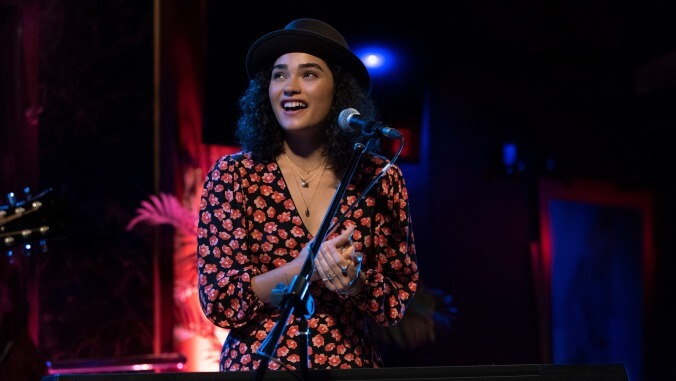Sara Bareilles’ melodic Apple TV+ series Little Voice is still finding itself


While hosting the 2018 Tony Awards, Sara Bareilles self-deprecatingly joked that she makes music you might hear at a Starbucks or in a hotel elevator. Although that sort of “easy listening” descriptor isn’t really a fair summation of Bareilles’ melodic Grammy- and Tony-nominated discography, it’s a more apt metaphor for the new Apple TV+ series she co-created and executive-produced. As a coming-of-age tale of twentysomething creative passion, Little Voice is watchable enough, especially since its episodes all hover around the 30-minute mark. But as Little Voice strives to introduce an earnest new voice to the TV landscape, it often struggles to rise above the level of amiable background music.
The series centers on Bess King (Star’s Brittany O’Grady), an aspiring singer-songwriter who works six jobs just to make ends meet in New York City. In between walking dogs, serving drinks, and singing at retirement homes, she scribbles lyrics on whatever scraps of paper she has at hand. Bess isn’t lacking for creative inspiration; she just has a problem with confidence. Although she’d like to consider herself a cross between Alessia Cara and Carole King, she’s haunted by the drunken boos she received when she debuted her own original material. But with the help of an almost pathologically supportive group of friends and fellow creatives, Bess finally starts to realize that her “little voice” might actually be worth hearing.
Tonally, Little Voice sits somewhere between the grimy realism of Girls and the feel-good fantasia of The Bold Type. On the quirky side, Bess writes music in a storage unit “studio” she’s decorated like an Anthropologie store. A dreamy British filmmaker named Ethan (Sean Teale) has improbably done the same next door, giving the show one leg of its central love triangle. Also competing for Bess’ affection is her sweet, supportive guitarist, Samuel (Colton Ryan). Yet in addition to its lighter romantic dramedy aims, Little Voice also delves into heavier material about abuse, self-sabotage, identity, alcoholism, sexual harassment in the music industry, and even violent hate crimes.
